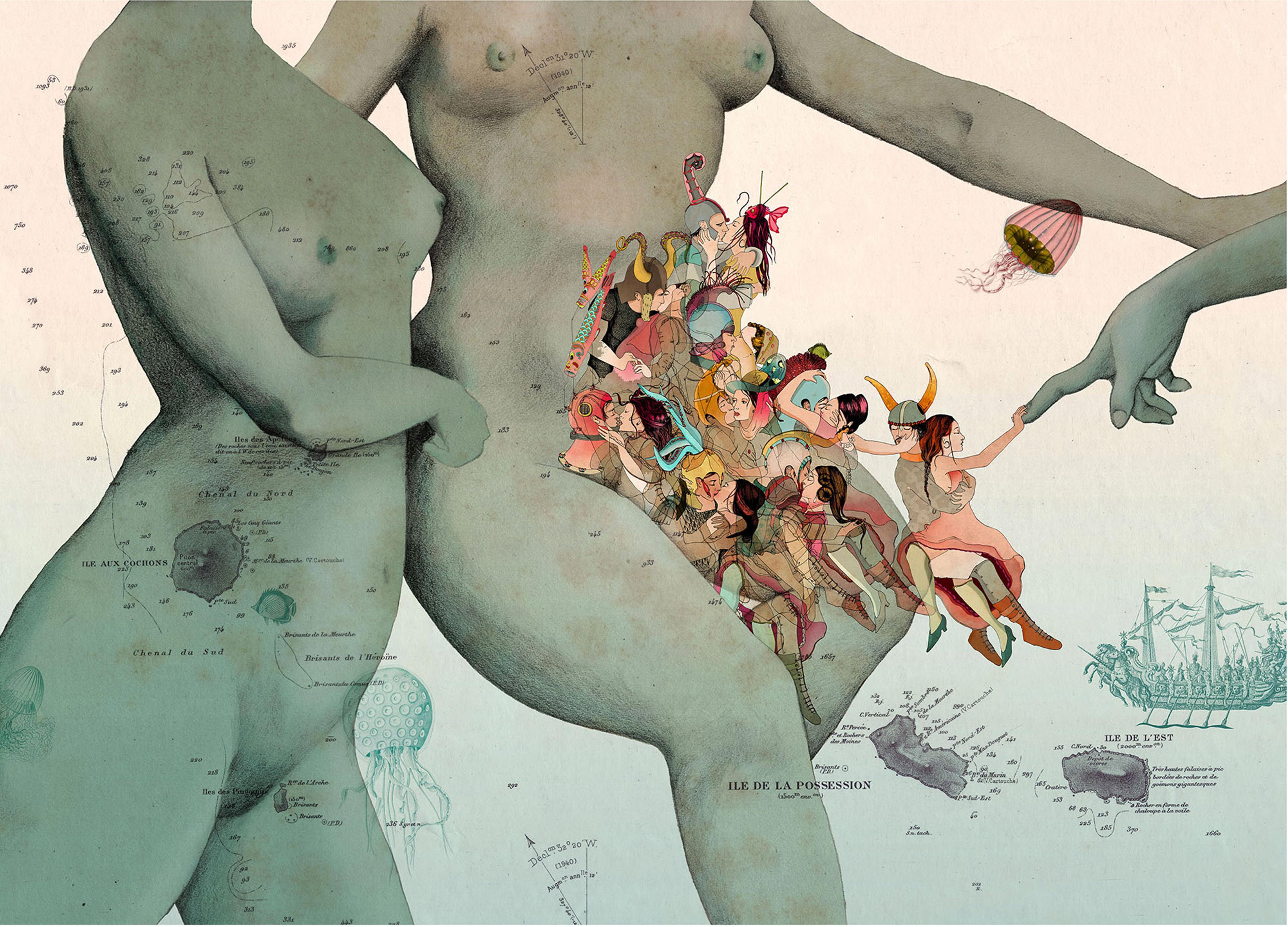Born in 1940 in New York, Saul Kripke is one of the most influential philosophers of the 20th century, yet few outside philosophy have heard of him, let alone have any familiarity with his ideas. Still, Kripke’s arguments are often fairly easy to grasp. And, as I explain here, his conclusions challenge widely held philosophical assumptions – including assumptions about the role and limits of philosophy itself.
I’ll also provide one illustration of how Kripke’s ideas can have relevance outside philosophy – to heated political debates about identity, ‘biological essentialism’, and how terms such as ‘woman’ and ‘white person’ function (do such terms latch on to hidden genetic and/or other biological features, as some maintain?)
No one with an interest in philosophy, or in such debates, can afford to be entirely ignorant about what Kripke has to say.
We use proper names such as ‘Aristotle’, ‘Donald Trump’ and ‘Paris’ to talk about people and places, and nouns such as ‘water’, ‘gold’ and ‘tiger’ to talk about various kinds of thing. Suppose I say: ‘Aristotle wrote many books.’ How does the name ‘Aristotle’ locate a historical individual, so that I can go on to say something about him – that he wrote many books?
For a long time, the dominant view was that names pick out the individuals they do via associated descriptions. On the view of Bertrand Russell (1872-1970), a proper name such as ‘Aristotle’ has the same meaning as a description such as ‘the pupil of Plato and teacher of Alexander (the Great)’ and so designates whoever uniquely ticks the boxes:
☐ was taught by Plato
☐ taught Alexander
The Enlightenment philosopher John Locke (1632-1704) thought that, similarly, nouns such as ‘gold’, ‘water’ and ‘tiger’ are synonymous with descriptions. For example, ‘gold’ has the same meaning as ‘the substance that is yellow, malleable, fusible [and so on]’. So, on Locke’s view, ‘gold’ picks out any and all samples of stuff that check the boxes:
☐ is yellow
☐ is malleable
☐ is fusible [etc]
Similarly, ‘water’ is synonymous with a description such as ‘the substance that’s wet, thirst-quenching, boils at 100°C [etc]’, and ‘tiger’ is synonymous with a description such as ‘the large, striped, carnivorous feline [etc]’.
Where do these checklists come from? We create them. In the case of ‘gold’, we put together the ideas of yellowness, fusibility, malleability, etc to create the checklist that determines what is and isn’t a sample of gold. In combining ideas in this way, we might follow nature, combining together ideas of properties that happen to be combined in reality. But not always. The idea of a unicorn combines the ideas of a single horn and a horse, though no such creature actually exists.
Many common nouns also refer directly, rather than by way of some sort of mental checklist
In the mid-20th century, Kripke, along with a number of other philosophers including Ruth Barcan Marcus, Hilary Putnam and David Kaplan, overthrew this consensus, arguing that many terms refer, not by way of things fitting some associated mental checklist, but directly.
According to Kripke, when a proper name is introduced, it’s typically attached directly to an individual. There might be a baptism in which we say: ‘By “Aristotle” we’ll mean him [pointing].’ Our intention is that the name should then pick out that person in any actual or possible situation, including situations where they happen not to fit the descriptions we associate with the name.
Consider a possible situation in which Aristotle goes in for gardening, while Aristotle’s brother is the person taught by Plato and who teaches Alexander. That didn’t happen, but it might have happened. Kripke points out that if ‘Aristotle’ just means ‘the pupil of Plato and teacher of Alexander’, then ‘Aristotle’ would pick out the wrong person in that possible situation.
Indeed, it seems that the actual situation could turn out to be one in which Aristotle has few if any of the properties we associate with him. Historians could conceivably discover that Aristotle was a fraud who claimed credit for the achievements of others – including being taught by Plato and teaching Alexander – and somehow got away with it. But if that’s true, then the name ‘Aristotle’ can’t just mean ‘the pupil of Plato and teacher of Alexander’. For then it would be a trivial truth, not a potentially contestable historical fact, that Aristotle was taught by Plato and taught Alexander.
Kripke argues that many common nouns, such as ‘gold’, ‘water’ and ‘tiger’, also refer directly, rather than by way of some sort of mental checklist. We define ‘gold’ by saying: ‘Gold is that substance’ (pointing to a sample) and allow the world, rather than any associated description, to determine the conditions under which something qualifies as a sample of gold.
The most famous illustration of how the name of a substance is supposed to function in this way is provided not by Kripke, but by Putnam, another leading proponent of the ‘theory of direct reference’.
Putnam asks us to imagine a Twin Earth – just like our Earth – which contains doppelgängers of us humans. The only difference between the two Earths is that on Twin Earth the clear, thirst-quenching, etc liquid that fills the oceans, lakes and rivers is not the chemical substance H2O, but another substance – XYZ. Suppose it’s 1750, before the chemical composition of water was discovered. On both Earths, the inhabitants call their liquid ‘water’. And, because it’s 1750, they associate the same mental checklist with that term: both think of ‘water’ as the substance that’s clear, thirst-quenching, boils at 100°C and so on. Now suppose a glass of XYZ is brought from Twin Earth to Earth and presented to Locke. Locke would believe it’s water, because it would tick his mental checklist. But would it be water? Not according to Putnam. Intuitively, that’s merely water-like stuff in the glass, not water. Putnam concludes that, while the term ‘water’ is associated with the same descriptions on Earth and Twin Earth, it has different meanings and picks out different chemical kinds. It is, and was, a necessary condition of something being water that it be H2O, despite this condition not being known back in 1750.
Similarly, Kripke argues that whether or not something is a sample of gold is determined by its atomic constitution – its atomic number (gold has the atomic number 79) – and not by its ticking any mental checklist associated with ‘gold’. Something that’s yellow, malleable, fusible and so on but lacks that atomic number is merely a kind of fool’s gold. And anything that possesses that atomic number is gold, even if it’s outwardly very different. According to Kripke, this was true in Locke’s day, before gold’s atomic constitution was known.
Likewise, Kripke posits that what makes something a tiger is its possession of certain underlying biological, genetic and/or evolutionary characteristics, not its being striped, carnivorous and so on. If creatures evolved on another planet that, while coincidentally outwardly just like tigers, had a very different internal constitution, they wouldn’t be tigers. Any description we associate with the term ‘tiger’ provides at best a convenient rule of thumb. It’s not what determines whether or not something is a tiger.
We don’t assume that there’s some underlying biological feature common and peculiar to all weeds
Kripke’s account seems to apply to other terms, too. Take the names of diseases. It seems that we use ‘malaria’ to pick out whatever is the underlying cause of the typical symptoms of that disease, rather than the symptoms. Even before we discovered what that underlying cause is (the plasmodium parasites, transmitted by mosquito bite), we would have acknowledged that someone might present with the symptoms of malaria, yet not have malaria but some other disease. Ticking off the associated checklist of symptoms doesn’t guarantee that you do have malaria. And failing to tick off that list doesn’t guarantee that you don’t have malaria (someone with malaria can be asymptomatic).
Does this account of how ‘gold’ and ‘tiger’ function apply to all common nouns? No. According to Putnam, while the term ‘jade’ was introduced as the name of a substance, it later turned out that two quite distinct substances had been grouped together under that name (jadeite and nephrite). These substances look and behave similarly, and so fooled us into thinking that they were a single substance. Yet they have very different internal structures. So, though we might have intended ‘jade’ to pick out some single, underlying constitution, it turns out that there wasn’t one to pick out.
It’s also plausible that words such as ‘car’ and ‘spoon’, for example, work in at least something like the way that Locke supposes. All that’s required for something to be a car or a spoon is that the object ticks off our mental checklist of observable properties. In the case of ‘car’, it need only be (roughly) a wheeled device made for transporting one or a handful of people around on roads. Outward appearance or function is all that matters. Inner constitution is irrelevant.
Another term that seems not to function in a Kripkean way is ‘weed’. We use ‘weed’ to refer to the various different plants that we prefer not to see in our gardens (because of their unattractiveness, destructiveness, etc). And we don’t assume that there’s some underlying biological feature common and peculiar to all weeds, as there is (arguably) to all roses or all tigers.
Kripke’s views have revolutionary consequences regarding the role and limits of philosophy. Here’s one example. Philosophers have traditionally distinguished between necessary and non-necessary truths. That Trump has been the US president is true, but it could have been otherwise. It’s not a necessary truth. That all triangles have three sides, on the other hand, would appear to be necessary. There’s no possible situation in which a four-sided triangle exists.
Before Kripke, revealing what’s necessary was widely supposed by philosophers to be a task for armchair philosophical or mathematical reflection, not scientific observation. Observation can reveal facts about how things are, of course, but it can’t reveal how things must be, as a matter of necessity. As Immanuel Kant (1724-1804) puts it: ‘Experience teaches us that a thing is so and so, but not that it cannot be otherwise.’
Kripke challenges that orthodoxy. Certainly, his claim that it takes science to reveal that necessarily gold has the atomic number 79 contradicts the claim that what’s necessary is revealed, if at all, only by armchair reflection. Kripke has, in effect, just redrawn the boundary between philosophy and science, handing over to science a significant chunk of what was traditionally deemed the province of philosophy.
His views are revolutionary, but are they true? There’s a broad post-Kripkean philosophical consensus that, at least when it comes to proper names, the description theory is wrong. What’s more contentious is whether Kripke is right about how nouns such as ‘gold’ function.
I’ve argued elsewhere that various stock objections to Kripke’s view about how ‘gold’ and ‘tiger’ function can be dealt with. However, as I explain below, it’s important not to get the claim that such terms latch on to initially hidden characteristics muddled up with some other highly controversial philosophical claims lurking in the vicinity.
I can’t find out if he’s a bachelor just by sitting in my armchair and having a good think
In suggesting that terms such as ‘gold’ and ‘tiger’ latch on to hidden constitutions – so that what’s necessary or essential, so far as being a sample of gold or a tiger is concerned, can be revealed only scientifically – Kripke was widely understood to be promoting a form of ‘essentialism’. Some took him to be suggesting that there are essences built into the fabric of the world – there are necessary truths ‘out there’, quite independently of our linguistic practices and conventions, waiting for scientists to discover them.
But perhaps we can sign up to Kripke’s account of how terms such as ‘gold’ and ‘tiger’ function without signing up to anything quite so philosophically exotic and exciting as that the world comes with necessity ‘built in’. Consider this nice illustration from the American philosopher Keith Donnellan (1931-2015). Suppose I introduce the word ‘whatchamacallit’ like so. I just stipulate that:
Necessarily: someone is a whatchamacallit if and only if they have the same marital status as that actually, currently possessed by him (I point to someone in the street whose marital status is unknown to me).
Now suppose I discover that the person I indicated is a bachelor. I can now deduce that:
Necessarily: someone is a whatchamacallit if and only if they’re a bachelor.
Yet my knowledge of this last necessary truth is dependent on my discovering the marital status of the person I pointed to, which requires observation. I can’t find out if he’s a bachelor just by sitting in my armchair and having a good think. So here’s another necessary truth it takes observation to reveal.
Still, it would be absurd to insist that this necessity concerning whatchamacallits was always ‘out there’, quite independently of our linguistic practices, waiting for us to discover it. Pretty clearly, the necessity of the conclusion is not ‘built into the world’. Rather, it was generated by my linguistic stipulation. All that the world contributes, so far as the truth of that conclusion is concerned, is just a fact – the fact that the person indicated happens to be a bachelor.
But then perhaps the same is true of the necessity that something is a sample of gold if and only if it has the atomic number 79. Just because we need to observe the world to reveal it doesn’t entail that the necessity is ‘built into the world’. It’s at least arguable that, just as in the whatchamacallit case, necessity is also ultimately a product of our linguistic stipulations or practices. In fact, Putnam has claimed exactly that: he says: ‘The “essence” of water in this sense is the product of our use of the word, the kinds of referential intentions we have: this sort of essence is not “built into the world”.’
I suspect at least some of the furore caused by Kripke’s and Putnam’s views on how words such as ‘gold’ function was because it was assumed that they were arguing for the terrifically philosophically exciting claim that the world comes with essence ‘built in’. However, it’s not clear that was ever their intention.
In my introduction, I suggested that reflecting on what Kripke has to say about how terms such as ‘gold’ and ‘tiger’ function can help to illuminate not just dry academic disputes, but also live political debates about, for example, identity and ‘biological essentialism’. Here are a couple of illustrations.
Currently, one of the most heated debates about identity is over the question of whether ‘trans women are women’. On one side are those who insist that they are, perhaps adding that to deny that trans women are women is a form of bigotry: transphobia. On the other side are those who insist that to be a ‘woman’, a person must possess certain genetic/biological features: perhaps some combination of XX chromosomes, reproductive organs and hormones. They argue that, as trans women fail to possess the right combination of those features, so they fail to qualify as women.
It’s clear that at least part of what’s at issue here is whether ‘woman’ functions in what we might call a ‘Kripkean’ way – ie, it latches on to certain underlying features, so that someone who lacks those features then fails to qualify as a woman (incidentally, I don’t mean to suggest that Kripke himself thinks that’s how ‘woman’ functions – so far as I’m aware, he’s expressed no view about that).
Personally, I don’t find implausible the suggestion that there is a well-established use of ‘woman’ that latches on to certain underlying biological/genetic features (and I think it pretty plausible that ‘female’ is used in this way). If that’s the case, then there’s a kind of ‘biological essentialism’ involved here: it’s essential, so far as qualifying as a ‘woman’ is concerned, that someone possess the relevant combination of underlying biological features.
But ‘biological essentialism’ is used in other ways too. Among other things, it’s used to refer to the views that:
- being a man or a woman is an essential property of any individual human being, so that a man cannot become a woman, or vice versa;
- that every human being must fall cleanly into just one of two boxes: man or woman;
- that these terms pick out underlying genetic/biological characteristics that determine and justify social roles (‘women should be home-makers’, ‘women should be subservient’).
Let’s just assume – merely for the sake of argument – that ‘woman’ does function in a Kripkean way, so that to qualify as a ‘woman’ requires possession of certain genetic and/or other hidden biological features. Would any of these other three varieties of ‘biological essentialism’ then follow?
No. First, the kind of ‘biological essentialism’ that says it’s in principle impossible for someone to change from man to woman, or vice versa, certainly doesn’t follow. While having the atomic number 79 is an essential property of gold, a piece of gold can be changed into another element by nuclear transformation. Similarly, even if being a ‘woman’ requires some combination of underlying genetic, hormonal and/or other biological features, there’s no reason in principle why it shouldn’t become medically possible to change a man’s internal physiology so that he becomes a woman (of course, trans women who undergo hormone treatment or gender confirmation surgery are changed internally; however, other internal characteristics associated with being a woman, such as having XX chromosomes and a womb, can’t currently be acquired). What would follow, of course, is that you couldn’t change a man into a woman just by, say, surgically altering their appearance.
Secondly, what of the kind of ‘biological essentialism’ which insists that every human is either a man or a woman? Is that entailed by the view that ‘man’ and ‘woman’ are used to pick out kinds distinguished, at least in part, by internal biological differences? Again, no. ‘Man’ and ‘woman’ could lie on a spectrum that includes intersex people who both outwardly and inwardly fall somewhere in between.
While how we use terms is a matter of fact, that’s not to say we can’t change the way we use language
Finally, does the suggestion that ‘woman’ picks out underlying genetic/biological characteristics entail that these characteristics determine and justify traditional social roles (‘women should be home-makers’, ‘women should be subservient’, etc)? Obviously not.
But does ‘woman’ have that sort of Kripkean use? Many certainly appear to use the term with the intention that it should function that way. However, even if some do use ‘woman’ (and, even more plausibly, ‘female’) that way, it’s arguable that they shouldn’t. Indeed, perhaps that’s what the ‘Are trans women women?’ debate is really about – not what words do mean, but what meaning we ought to give them. We ought to use ‘woman’ so that trans women qualify as women, irrespective of whether they happen to have undergone hormone treatment, surgery and so on. While how we use terms is a matter of fact, that’s not to say we can’t change the way we use language, and that there might not be good reasons to change that usage (to help combat the appalling discrimination that trans people receive, for example).
On the other hand, there might be a case for retaining a Kripkean use. Some argue that, as the use of ‘woman’ is heavily woven into a history of hierarchy, privilege and oppression grounded in biological and reproductive difference, erasing all notions of womanhood grounded in such difference would be a significant obstacle to fighting that injustice. (The philosopher Sally Haslanger argues that, at least within certain sorts of discussion of traditional sexist oppression and injustice, theorists ought to use ‘woman’ in a way that recognises that women have been targeted for subordination on the basis of observed or imagined bodily features presumed to be evidence of a female’s biological role in reproduction.)
Other terms that are alleged by some to latch on to underlying biological or genetic differences include, for example, ‘white person’, ‘Latino’, ‘Jewish’, ‘African American’, ‘Native American’. But do these expressions function in that way?
What is true is that these categories are in many cases tied essentially to geographical origin. A ‘Latino’ must have an ancestral connection to a Latin American country, and an ‘African American’ must have an ancestral connection to Africa. Even ‘white person’ is often used more or less interchangeably with ‘of European descent’.
What’s less clear is whether any of the terms that we use to categorise humans in terms of race or ethnicity are ever used with the intention that they should also latch on to certain underlying biological/genetic characteristics. I doubt that they are. Consider a hypothetical individual of Native American descent, who, as a result of a bizarre genetic mutation, has both genetic characteristics and outward appearance usually associated with African Americans. Is that person a Native American? I’d say: pretty obviously yes. But if that is the correct verdict, then neither outward appearance nor genetic characteristics are essential so far as being a Native American is concerned. Genealogy alone is both necessary and sufficient.
Still, if terms such as ‘Native American’, ‘white person’, etc did happen to latch on to underlying genetic characteristics, so that possession of those characteristics was both necessary and sufficient to qualify someone as ‘Native American’ etc, would the following fourth form of ‘biological essentialism’ sometimes associated with race then follow?
- terms such as ‘Native American’ and ‘white person’ carve nature at the joints, picking out scientifically significant kinds that are ‘out there’ quite independently of our own subjective interests or prejudices.
No, it wouldn’t follow. Suppose (plausibly, I think) that there are internal genetic and biological differences between redheads and non-redheads, between those with snub noses and those without, and between those with webbed feet and those without, which explains these outwardly observable differences. Now consider a hypothetical society that venerates and privileges individuals with a combination of red hair, a snubbed nose and webbed feet. Suppose they use ‘wibble’ to refer to anyone possessing whatever combination of biological/genetic features is responsible for producing that combination of outward features. Even if ‘wibble’ and ‘non-wibble’ did successfully latch on to the presence or absence of certain underlying genetic features, it wouldn’t follow that this society’s division of humans into wibbles and non-wibbles would be of any scientific use, or that they were ‘carving nature at the joints’. While wibbles and non-wibbles would certainly exist, and would even have their own underlying Kripkean ‘essences’, the use of these terms would also very obviously reflect the subjective preferences and prejudices of that particular society. They wouldn’t be ‘carving nature at the joints’. But then the same can also be true of ‘Native American’, ‘white person’ and so on, even if these expressions did successfully latch on to certain underlying biological and/or genetic features (and, as I say, I doubt that they do).
Of course, none of this is to deny that there are genetic differences between this or that group which account for, say, lighter or darker skin, and that these genetic differences can have other important, scientifically investigable consequences – such as susceptibility to different diseases (lighter skin is more prone to skin cancer, while a darker skin increases your risk of vitamin D deficiency).
I’ve tried to illustrate how an understanding of Kripke’s work on how common nouns are used can at least throw a little light on, if not definitively settle, debates about identity and ‘biological essentialism’. In particular, it’s worth getting clear that the kind of ‘biological essentialism’ involved in Kripke’s account of how terms such as ‘tiger’ function – which could be correct (and, in the case of ‘tiger’, I think is correct) – is very different to other far more contentious, and in some cases pretty toxic, forms of ‘biological essentialism’ that can crop up in debates about identity, racism, sexism and trans issues.
The views expressed here are entirely those of the author.






